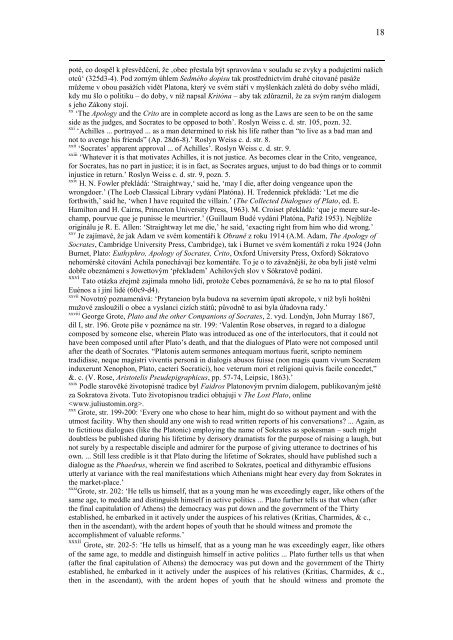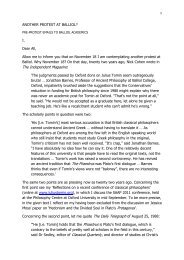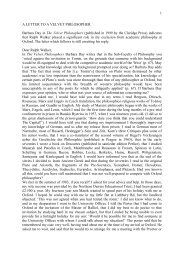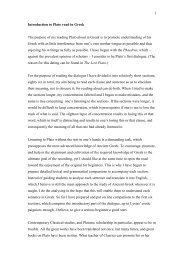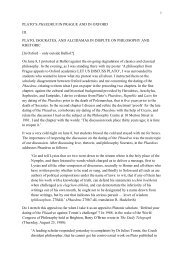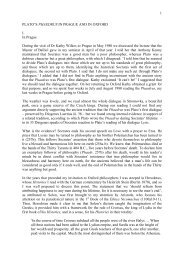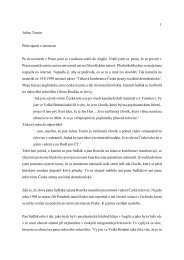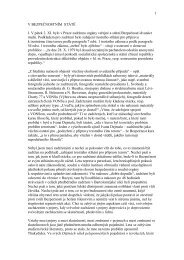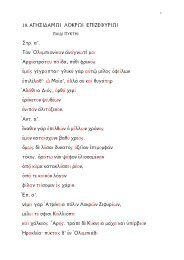1 Sokrates a zákony obce Platonovy dialogy Kritón a ... - Julius Tomin
1 Sokrates a zákony obce Platonovy dialogy Kritón a ... - Julius Tomin
1 Sokrates a zákony obce Platonovy dialogy Kritón a ... - Julius Tomin
You also want an ePaper? Increase the reach of your titles
YUMPU automatically turns print PDFs into web optimized ePapers that Google loves.
poté, co dospěl k přesvědčení, že ‚obec přestala být spravována v souladu se zvyky a podujetími našich<br />
otců‘ (325d3-4). Pod zorným úhlem Sedmého dopisu tak prostřednictvím druhé citované pasáže<br />
můžeme v obou pasážích vidět Platona, který ve svém stáří v myšlenkách zalétá do doby svého mládí,<br />
kdy mu šlo o politiku – do doby, v níž napsal <strong>Kritón</strong>a – aby tak zdůraznil, že za svým raným dialogem<br />
s jeho Zákony stojí.<br />
xx<br />
‘The Apology and the Crito are in complete accord as long as the Laws are seen to be on the same<br />
side as the judges, and Socrates to be opposed to both’. Roslyn Weiss c. d. str. 105, pozn. 32.<br />
xxi<br />
‘Achilles ... portrayed ... as a man determined to risk his life rather than “to live as a bad man and<br />
not to avenge his friends” (Ap. 28d6-8).’ Roslyn Weiss c. d. str. 8.<br />
xxii<br />
‘Socrates’ apparent approval ... of Achilles’. Roslyn Weiss c. d. str. 9.<br />
xxiii<br />
‘Whatever it is that motivates Achilles, it is not justice. As becomes clear in the Crito, vengeance,<br />
for Socrates, has no part in justice; it is in fact, as Socrates argues, unjust to do bad things or to commit<br />
injustice in return.’ Roslyn Weiss c. d. str. 9, pozn. 5.<br />
xxiv<br />
H. N. Fowler překládá: ‘Straightway,‘ said he, ‘may I die, after doing vengeance upon the<br />
wrongdoer.’ (The Loeb Classical Library vydání Platóna). H. Tredennick překládá: ‘Let me die<br />
forthwith,’ said he, ‘when I have requited the villain.’ (The Collected Dialogues of Plato, ed. E.<br />
Hamilton and H. Cairns, Princeton University Press, 1963). M. Croiset překládá: ‘que je meure sur-lechamp,<br />
pourvue que je punisse le meurtrier.’ (Guillaum Budé vydání Platóna, Paříž 1953). Nejblíže<br />
originálu je R. E. Allen: ‘Straightway let me die,’ he said, ‘exacting right from him who did wrong.’<br />
xxv<br />
Je zajímavé, že jak Adam ve svém komentáři k Obraně z roku 1914 (A.M. Adam, The Apology of<br />
Socrates, Cambridge University Press, Cambridge), tak i Burnet ve svém komentáři z roku 1924 (John<br />
Burnet, Plato: Euthyphro, Apology of Socrates, Crito, Oxford University Press, Oxford) Sókratovo<br />
nehomérské citování Achila ponechávají bez komentáře. To je o to závažnější, že oba byli jistě velmi<br />
dobře obeznámeni s Jowettovým ‘překladem’ Achilových slov v Sókratově podání.<br />
xxvi<br />
Tato otázka zřejmě zajímala mnoho lidí, protože Cebes poznamenává, že se ho na to ptal filosof<br />
Euénos a i jiní lidé (60c9-d4).<br />
xxvii<br />
Novotný poznamenává: ‘Prytaneion byla budova na severním úpatí akropole, v níž byli hoštěni<br />
mužové zasloužilí o obec a vyslanci cizích států; původně to asi byla úřadovna rady.’<br />
xxviii<br />
George Grote, Plato and the other Companions of Socrates, 2. vyd. Londýn, John Murray 1867,<br />
díl I, str. 196. Grote píše v poznámce na str. 199: ‘Valentin Rose observes, in regard to a dialogue<br />
composed by someone else, wherein Plato was introduced as one of the interlocutors, that it could not<br />
have been composed until after Plato’s death, and that the dialogues of Plato were not composed until<br />
after the death of Socrates. “Platonis autem sermones antequam mortuus fuerit, scripto neminem<br />
tradidisse, neque magistri viventis personâ in dialogis abusos fuisse (non magis quam vivum Socratem<br />
induxerunt Xenophon, Plato, caeteri Socratici), hoc veterum mori et religioni quivis facile concedet,”<br />
&. c. (V. Rose, Aristotelis Pseudepigraphicus, pp. 57-74, Leipsic, 1863).’<br />
xxix<br />
Podle starověké životopisné tradice byl Faidros Platonovým prvním dialogem, publikovaným ještě<br />
za Sokratova života. Tuto životopisnou tradici obhajuji v The Lost Plato, online<br />
.<br />
xxx<br />
Grote, str. 199-200: ‘Every one who chose to hear him, might do so without payment and with the<br />
utmost facility. Why then should any one wish to read written reports of his conversations? ... Again, as<br />
to fictitious dialogues (like the Platonic) employing the name of <strong>Sokrates</strong> as spokesman – such might<br />
doubtless be published during his lifetime by derisory dramatists for the purpose of raising a laugh, but<br />
not surely by a respectable disciple and admirer for the purpose of giving utterance to doctrines of his<br />
own. ... Still less credible is it that Plato during the lifetime of <strong>Sokrates</strong>, should have published such a<br />
dialogue as the Phaedrus, wherein we find ascribed to <strong>Sokrates</strong>, poetical and dithyrambic effusions<br />
utterly at variance with the real manifestations which Athenians might hear every day from <strong>Sokrates</strong> in<br />
the market-place.’<br />
xxxi<br />
Grote, str. 202: ‘He tells us himself, that as a young man he was exceedingly eager, like others of the<br />
same age, to meddle and distinguish himself in active politics ... Plato further tells us that when (after<br />
the final capitulation of Athens) the democracy was put down and the government of the Thirty<br />
established, he embarked in it actively under the auspices of his relatives (Kritias, Charmides, & c.,<br />
then in the ascendant), with the ardent hopes of youth that he should witness and promote the<br />
accomplishment of valuable reforms.’<br />
xxxii<br />
Grote, str. 202-5: ‘He tells us himself, that as a young man he was exceedingly eager, like others<br />
of the same age, to meddle and distinguish himself in active politics ... Plato further tells us that when<br />
(after the final capitulation of Athens) the democracy was put down and the government of the Thirty<br />
established, he embarked in it actively under the auspices of his relatives (Kritias, Charmides, & c.,<br />
then in the ascendant), with the ardent hopes of youth that he should witness and promote the<br />
18


